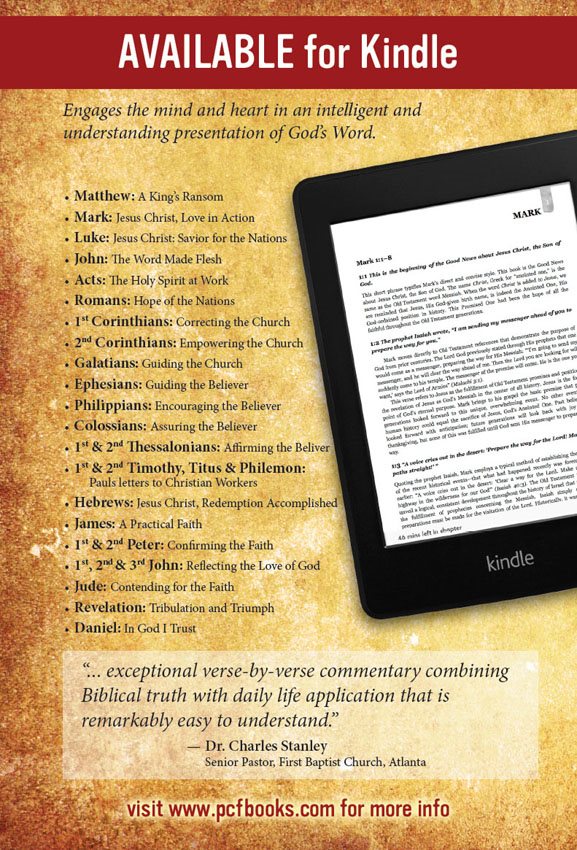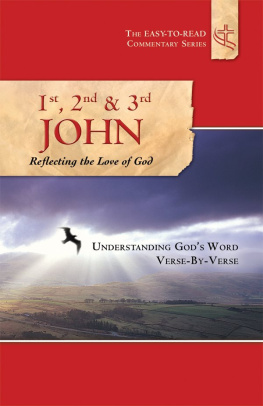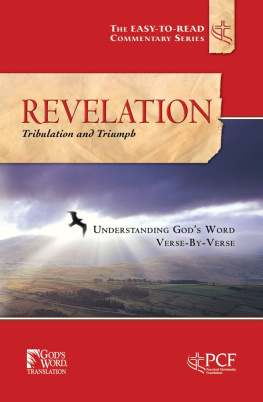
1st, 2nd, & 3rd J OHN R EFLECTING THE L OVE OF G OD
by Practical Christianity Foundation
This book or parts thereof may not be reproduced in any form, stored in a retrieval system, or transmitted in any form by any meanselectronic, mechanical, photocopy, recording, or otherwisewithout prior written permission of the publisher, except as provided by United States of America copyright law.
All scriptural references, unless otherwise noted, are quoted from G OD S W ORD Translation. 1995 by Gods Word to the Nations. Used by permission.
Scripture quotations marked ( KJV ) are taken from The Holy Bible, King James Version. Scripture quotations marked ( NKJV ) are taken from The Holy Bible, New King James Version. 1979, 1980, 1982 by Thomas Nelson, Inc. Used by permission. All rights reserved.
Cover art: The Resource Agency, Franklin, Tennessee
Project Management by JJ Graphics
Copyright 2013 by Practical Christianity Foundation
All rights reserved
International Standard Book Number: 978-1-60098-071-8



CONTENTS | 
|
PREFACE | 
|
From the conception of the Practical Christianity Foundation, it has been the goal of the organization to convey the truth in Scripture through verse-by-verse devotional studies such as this one. As part of that goal, we agree in an attempt neither to prove nor disprove any traditional or alternative interpretations, beliefs, or doctrines, but rather to allow the Holy Spirit to reveal the truth contained within the Scriptures. Any interpretations relating to ambiguous passages that are not directly and specifically verifiable by other scriptural references are simply presented in what we believe to be the most likely intention of the message based upon those things that we are specifically told. In those instances, our conclusions are noted as interpretive, and such analyses should not be understood as doctrinal positions that we are attempting to champion.
This study is divided into sections, usually between six and eight verses, and each section concludes with a Notes/Applications passage, which draws practical insight from the related verses that can be applied to contemporary Christian living. The intent is that the reader will complete one section per day, will gain a greater understanding of the verses within that passage, and will daily be challenged toward a deeper commitment to our Lord and Savior Jesus Christ. Also included at certain points within the text are Dig Deeper boxes, which are intended to assist readers who desire to invest additional time to study topics that relate to the section in which these boxes appear. Our prayer is that this study will impact the lives of all believers, regardless of age, ethnicity, or education.
Each of PCFs original projects is a collaborative effort of many writers, content editors, grammatical editors, transcribers, researchers, readers, and other contributors, and as such, we present them only as products of the Practical Christianity Foundation as a whole. These works are not for the recognition or acclamation of any particular individual but are written simply as a means to uphold and fulfill the greater purpose of our Mission Statement, which is to exalt the Holy Name of God Almighty by declaring the redemptive message of His Son, the Lord Jesus Christ, to the lost global community and equipping the greater Christian community through the communication of the Holy Word of God in its entirety through every appropriate means available.
Practical Christianity Foundation Value Statements
1.We value the Holy Name of God and will strive to exalt Him through godly living, committed service, and effective communication. As long as you live, you, your children, and your grandchildren must fear the Lord your God. All of you must obey all his laws and commands that Im giving you, and you will live a long time (Deuteronomy 6:2).
2.We value the redemptive work of the Lord Jesus Christ for a lost world and will strive to communicate His redemptive message to the global community. Then Jesus said to them, So wherever you go in the world, tell everyone the Good News (Mark 16:15).
3.We value the Holy Word of God and will strive to communicate it in its entirety. 16Every Scripture passage is inspired by God. All of them are useful for teaching, pointing out errors, correcting people, and training them for a life that has Gods approval. 17They equip Gods servants so that they are completely prepared to do good things (2 Timothy 3:1617).
4.We value spiritual growth in Gods people and will strive to enhance that process through the effective communication of Gods Holy Word, encouraging them to be lovers of the truth. But grow in the good will and knowledge of our Lord and Savior Jesus Christ. Glory belongs to him now and for that eternal day! Amen (2 Peter 3:18).
5.We value the equipping ministry of the church of the Lord Jesus Christ and will strive to provide resources for that ministry by the communication of Gods Holy Word through every appropriate means available. 11He also gave apostles, prophets, missionaries, as well as pastors and teachers as gifts to his church. 12Their purpose is to prepare Gods people to serve and to build up the body of Christ (Ephesians 4:1112).
The Epistles of
JOHN | 
|
Introduction | 
|
Although these letters were not signed, the predominant evidence from the early church fathers ascribes these epistles to the same apostle John who wrote the gospel account which bears his name. This John was the beloved apostle of Jesus during His three years of ministry. He was a fisherman who followed Jesus, listened to His teaching, was nearby when He was arrested, was present at the crucifixion, and was an eyewitness of the risen Lord. It is generally accepted that John wrote these letters around A.D. 9095 since much of his content addresses the teachings of Gnosticism, which rose to prominence at the close of the first century. in Asia Minor, now western Turkey. They inform us that John, well advanced in years by that time, served as overseer of the churches in the area. Because of his unique apostolic position, he was appropriately called The Church Leader. As the last living disciple of the Lord, he was inextricably connected to the generation that had witnessed the remarkable life of Jesus Christ. Those generations that followed never actually saw the Lord but relied on the truth of eyewitness testimony.
Next page
















